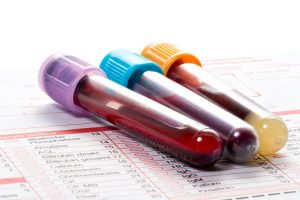
The presence of elevated levels of LDH can be used as a marker for acute or chronic cell damage, as during illness or injury that damages cell bodies, LDH is released into the blood stream. These levels can be measured and used as a sign of potential illness complications.
Types of LDH isoenzymes
Five different forms of LDH exist, all of which have different structures used for identification. Each form of the LDH enzyme is called an isoenzyme, with different lactate dehydrogenase isoenzymes being found in different body tissues. The highest concentration of each type is as follows:
- LDH-1: heart and red blood cells
- LDH-2: white blood cells
- LDH-3: lungs
- LDH-4: kidneys, placenta, and pancreas
- LDH-5: liver and skeletal muscle
What causes high LDH levels in blood?
When high levels of LDH are seen during laboratory testing, it may indicate a number of different pathologies, as the enzyme can be found originating in many different parts of the body. Lactate dehydrogenase test results showing elevated LDH isoenzymes may indicate:
- Cerebrovascular accident
- Heart attack
- Infectious mononucleosis
- Low blood pressure
- Muscular dystrophy
- Tissue death
- Blood flow deficiency
- Certain cancers
- Hemolytic anemia
- Liver disease
- Muscle injury
- Pancreatitis
- Use of alcohol or certain drugs
What is a lactate dehydrogenase test?
Lactate dehydrogenase function is typically measured through the use of a blood test, but occasionally, medical professionals may measure LDH levels using urine or cerebral spinal fluid.
A blood test generally involves drawing blood from a vein located on the inner arm. A nurse or phlebotomist will then sanitize the area with antiseptic and wrap a rubber band around the upper portion of the arm, making the vein in the arm swell and become more visible. They will then gently insert a needle that will collect blood in a glass tube to be sent off for testing.
Certain medications and drugs may affect the accuracy of an LDH test. Vitamin C, for example, may lower LDH levels seen during lab testing. Alcohol, anesthetics, aspirin, fluorides, mithramycin, and procainamide may also falsely raise LDH levels in lab tests.
How to prepare for the lactate dehydrogenase test?
In order to obtain the most accurate results possible for an LDH test, your doctor may ask you to stop taking certain medications. Such medications include aspirin, clofibrate, mithramycin, opioids, procainamide, and fluorides. It is always a good idea to disclose any and all currently used medication to your doctor, including over-the-counter herbal medications.
What is a lactate dehydrogenase test used for?
It is important to keep in mind that LDH is considered a non-specific finding and is not independently linked to a specific disease or disorder. It is instead used to help evaluate a number of different diseases and conditions. LDH levels increase in the blood stream in response to cellular damage, making it a feature of many conditions. An LDH blood test may be helpful in the following scenarios:
- A general indicator of the existence and severity of acute or chronic tissue damage
- To help detect and monitor conditions such as anemia or severe infections
- To help stage, determine prognosis, and/or monitor treatment of cancers
- Can be used to distinguish between viral and bacterial meningitis by evaluating LDH in cerebrospinal fluid
- Can help differentiate between exudate and transudate for peritoneal or pericardial fluid, guiding treatment
Lactate dehydrogenase test results mean
Elevated levels of LDH in lab tests may indicate some tissue damage, with particular elevations of more than one isoenzyme subtype possibly indicating more than one cause of tissue damage. This may be seen in a patient who has a pneumonia infection, but subsequently gets a heart attack. High levels of all five LDH isoenzymes mentioned may indicate multiple organ failures.
Because of this non-specificity, the use of high LDH levels can prompt the investigation into other disorders. For example, if the LDH isoenzyme associated with the liver is elevated, your doctor will perform further testing, such as a full liver panel.
Normally, a person will have higher levels of LDH-2 than LDH-1. After a heart attack, however, this is reversed—called a flipped pattern. Also, the total LDH level will rise within 24 to 72 hours after a heart attack and peak in about two to four days, with levels returning to normal in about 10 to 14 days. Clues such as these are valuable and often guide treatment consideration.
Low levels of LDH affect how the body breaks down sugar for energy, particularly in muscle cells. It is very uncommon for an individual to have low LDH levels or a lactate dehydrogenase deficiency. However, low levels of LDH have been documented in some genetic mutations where fatigue and muscle pain may be presenting symptoms. Low levels of LDH have also been observed in those who have consumed substantial amounts of vitamin C.
High LDH levels test risk
LDH levels are commonly obtained by first obtaining a blood sample. This may pose certain risks to those who are averse to needles or the sight of blood. Risks associated with drawing blood may include:
- Excessive bleeding
- Fainting or feeling light-headed
- Hematoma
- Infection
Related: 7 symptoms that reveal the health of your liver